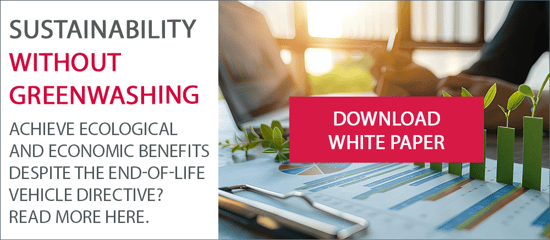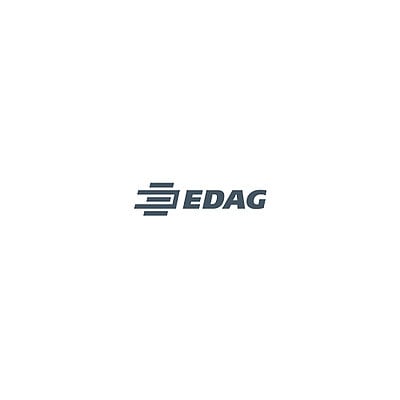With industry-specific regulations such as the new EU End-of-Life Vehicles Directive and various reporting obligations, more and more companies are being forced to take a closer look at the issue of sustainability. The pressure along the supply chain is also growing. At the same time, a sustainability strategy and the associated improved database offer the opportunity to improve a company's profitability.
The consequences of climate change are becoming increasingly apparent, for example in catastrophic droughts or "floods of the century" every few years. Although a global agreement to reduce CO2 emissions was reached in Paris in 2015, politicians are only gradually recognizing the urgency of the task. In the EU, the "Fit for 55" initiative was recently adopted as part of the EU's "Green Deal" decarbonization strategy in order to reduce CO2 emissions more quickly. However, the policy is not only aimed at greater sustainability. The programmes are also intended to help drive forward digitalization and strengthen competitiveness.
But beyond the climate issue, the EU has also been working for many years to encourage the economy in the member states to become more environmentally friendly and sustainable. For example, the management of packaging and packaging waste was regulated uniformly throughout the EU for the first time 30 years ago. A further step towards reducing waste was the adoption of the End-of-Life Vehicles Directive (Directive 2000/53/EC), which transferred the principles of the packaging regulations to another economic sector at the turn of the millennium - and more were to follow.
On the way to a circular economy
After almost a quarter of a century, the End-of-Life Vehicles Directive has now also been revised and merged with Directive 2005/64/EC on the type-approval of motor vehicles with regard to their reusability, recyclability and recoverability. Similar to the revised Battery Directive, the new version also takes the entire life cycle of end-of-life vehicles into account. The End-of-Life Vehicles Directive is just one pioneering example of how the requirements can be applied to other product groups.
The aim is a holistic value creation cycle that begins with a product design that supports circular processes and also addresses collection and recycling or reuse at the end of the life cycle. Recycling quotas - i.e. a defined minimum quota of recycled substances and materials in new vehicles - are intended to ensure a viable business case for the recycling of end-of-life vehicles. 
For example, type approval must ensure that at least 85% of the mass is "reusable or recyclable" and at least 95% is "reusable or recyclable" (excluding batteries). In addition, a proportion of 25 percent recyclate is prescribed for the use of plastics. Corresponding quotas for steel, aluminum/alloys, magnesium/alloys and rare earths are to follow later. Furthermore, each vehicle is to receive a digital cycle passport that provides information on the removal and replacement of parts, components and materials.
Vehicle manufacturers are obliged to draw up a circular economy strategy for each approved type of car. In addition, they are to take care of the establishment of collection systems and points or contribute financially to them.
Data and complete documentation form the foundation
Due to the very strict documentation and verification requirements of the automotive industry, their requirements can also be transferred to other product groups:
- Calculation of the recycling rate;
- Documentation of disassembly Product
- Material controlling: Tracking and documentation of material data and recyclates;
- Material compliance;
- Preparation of an environmental impact analysis;
- Creation/calculation of CO2 forecasts, e.g. material or process comparisons;
- Capture and typification of requirements through to requirements management and support;
- Supplier management: data requests, support and system maintenance;
- Change management in product development: documentation of the product development process;
- Product management - organization, communication and organization of product development
Comprehensive database required beyond the product
The End-of-Life Vehicles Directive is just one sector-specific example of the transformation of industry towards greater environmental and climate compatibility. There are also a whole range of other requirements that industrial companies of all kinds now have to deal with.
These include, for example:
- Environmental and sustainability management systems: compliance with ISO and EMAS requirements, basis for certification, audits and analyses;
- Supply chain / supplier management: data requests, support and system maintenance;
- Environmental protection: recording and controlling emissions and immissions, hazard assessments, risk analyses, etc.;
- Sustainability documentation and certification: Preparation of corporate documentation of sustainability activities through to preparation and submission for certification according to various specifications;
Investors and lenders, who in turn are obliged to report on "sustainable" investments, are now also demanding data on various sustainability issues. The same applies to the clients of suppliers who require valid data from the supply chain. On the one hand, for their own reporting obligations and, on the other, to manage the company's own decarbonization strategies. Those who are unable to provide this data must expect to lose orders or no longer be considered for new orders in the future.
And last but not least, consumers are also asking questions about the environmental and climate friendliness of products, compliance with human rights and social standards in the production and extraction of raw materials, sustainability and diversity, so that corporate communications and marketing need quick access to the relevant key figures.
Positive effects should not be overlooked
Companies provide evidence of the progress made and compliance with legal requirements through the aforementioned reporting obligations. This could be dismissed as burdensome, possibly unnecessary bureaucracy. However, there is a second effect associated with this: companies are forced to collect the necessary data, regardless of whether they are actively leading the transformation or are lagging behind. The idea behind this: If the database is already available, the hurdle to taking the next step - that of active management - is much lower.
On the one hand, it is therefore necessary to make existing data accessible, which can often only be found in department-specific data silos, and to supplement missing data points. And secondly, to create processes and systems that are capable of expanding the flow of information within the company in line with the requirements of the sustainability strategy.
However, companies should not only see this challenge as a burden - but also as an opportunity. This is because the more sophisticated database opens up additional opportunities for corporate management. The comparison of alternatives - in purchasing, in product design, in the production process - provides a sound basis for decision-making not only in terms of climate friendliness, but also in terms of economic efficiency. This means that investments in a better data infrastructure pay off in the long term.
Proven processes and helpful tools
In many cases, however, there is a lack of both the experience and the human resources to develop, let alone implement, a comprehensive sustainability strategy. The lack of data on the one hand and the shortage of specialists on the other exacerbate the problem.
In this situation, company managers should look for suitable partners who can fill the existing gaps with experience and their own human resources. One such partner is the industrial services provider EDAG, which has already completed numerous projects relating to sustainability. As part of these activities, it has also developed numerous best practice processes as well as its own tools and applications that enable the efficient management of tasks relating to the "green transformation" of industrial companies.
This includes, for example, the "Quick Life Cycle Assessment" (QLCA). This tool-supported process enables developers to make material and concept decisions at an early stage that have a positive impact on the CO2 footprint of a product over its entire life cycle. Standardized processes have also been developed for a comprehensive lifecycle analysis, which enable an efficient procedure.
In addition, EDAG has the necessary expertise from the development and optimization of production to make the data infrastructure fit for the additional tasks arising from the sustainability requirements and thus provide the administration with a database that covers all aspects. The service provider also offers extensive coaching and training services as a contribution to the change management of a sustainability project.
Conclusion
The topic of sustainability is a challenge for companies that are under pressure from various sides. Nevertheless, the topic is also an economic opportunity, as a better database makes it possible to combine ecology and economy. Only those who know the alternatives and can back them up with figures are in a position to make the best business decision. Financial analyses in recent years have shown that more sustainable companies are more crisis-resistant and economically more successful in the long term.
However, redesigning company processes in terms of sustainability is not an easy undertaking. Firstly, it is necessary to create a meaningful database in the first place. Then it is necessary to identify and compare alternatives for complex processes, with their dependencies and interactions. This task can hardly be accomplished without external support, given the expertise and personnel required.
If you are also planning a sustainability project and are looking for a partner with broad expertise and many years of experience, talk to Isabel Knigge, Team Leader process and product data management, who will be happy to answer your questions. Or download our whitepaper "Sustainability check in 20 questions", which gives you an overview of the most important aspects of a sustainability strategy and the necessary first steps. 





